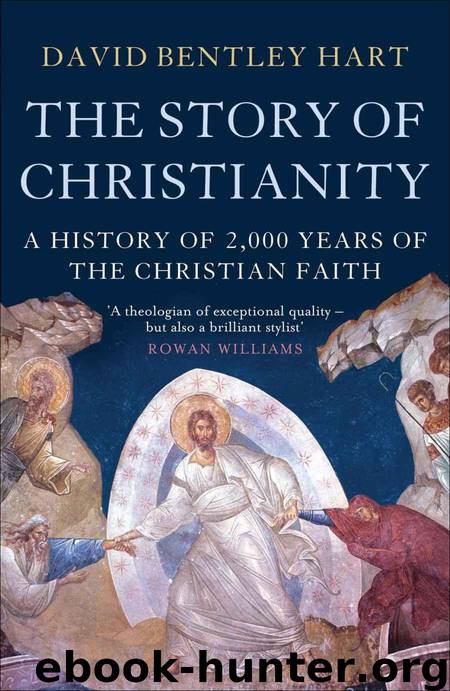The Story of Christianity: A History of 2000 Years of the Christian Faith by David Bentley Hart

Author:David Bentley Hart
Language: eng
Format: mobi
Publisher: Quercus
Published: 2013-06-05T23:00:00+00:00
The Early Crusades
The idea of a ‘holy war’ is alien to Christian theological tradition. It is self-evidently incompatible with the recorded teachings of Christ, and would have been abhorrent to the mind of the ancient Church. Of course, Christian rulers – such as Justinian and Charlemagne – had often enough shown themselves willing to coerce ‘faith’ from their more intractable subjects, for the sake of state unity. But none, as far as we know, ever presumed to represent his military adventures as divine missions.
At the very end of the 11th century, however, the notion that a war might be not merely ‘just’, but also a ‘sacred cause’, insinuated itself into Catholic thought. Ironically enough, this was in part the result of a concerted effort on the part of the Church to discourage and limit warfare. From the late tenth to the mid-11th century, Church synods in France had instituted the convention called the ‘Peace of God’, which threatened excommunication for private wars and attacks upon women, peasants, merchants, clergy or other non-combatants, and which required every house to pledge itself to preserve the peace. Other synods, over the course of the 11th century, introduced the ‘Truce of God’, which prohibited armed conflict on so many days of the year – penitential periods, holy days, harvests, and from Wednesday evening to Monday morning every week – that ultimately more than three-quarters of the calendar were off limits.
High Ideals and Low Motives
It may seem somewhat ironic, then, that it was at the Council of Clermont in 1095 – which reaffirmed and expanded the Truce of God – that Pope Urban II (c.1035–99) called for the First Crusade. But chief among the guiding ideals of the Truce was a commitment to protect the defenceless against the depredations of violent men, and Urban was responding to tales coming from the East of Christians (native Easterners and Western pilgrims to the Holy Land) who had been robbed, enslaved and murdered by the Seljuq Turks, as well as to the appeals of the Byzantine Emperor Alexius I Comnenus (1057–1118) for military aid in resisting Seljuq aggressions in the Eastern Christian world – Anatolia, Armenia, Byzantine Asia Minor and West Syria.
The cause of Crusade, however, attracted an element that in all likelihood the pope had not expected. Rather than armies of the chivalrous and saintly eager to rescue the oppressed, many of the forces that assembled consisted in little more than armed gangs of brigands. Several of these, in fact, began their journey by robbing and murdering Rhineland Jews in their thousands in 1096, and even attacking local bishops who attempted to protect the Jews within their diocesan boundaries – and then, as a rule, disbanding before ever actually reaching the East.
The properly organized crusader armies, however, were under the command principally of French noblemen, and began a more orderly eastward advance in August 1096. In all, some 4000 knights assembled in Constantinople in 1097, bringing with them between 20,000 and 30,000 foot soldiers. Alexius, fearing with
Download
This site does not store any files on its server. We only index and link to content provided by other sites. Please contact the content providers to delete copyright contents if any and email us, we'll remove relevant links or contents immediately.
| Buddhism | Christianity |
| Ethnic & Tribal | General |
| Hinduism | Islam |
| Judaism | New Age, Mythology & Occult |
| Religion, Politics & State |
Cecilia; Or, Memoirs of an Heiress — Volume 1 by Fanny Burney(32549)
Cecilia; Or, Memoirs of an Heiress — Volume 2 by Fanny Burney(31948)
Cecilia; Or, Memoirs of an Heiress — Volume 3 by Fanny Burney(31932)
The Secret History by Donna Tartt(19058)
Sapiens: A Brief History of Humankind by Yuval Noah Harari(14371)
Leonardo da Vinci by Walter Isaacson(13319)
The Radium Girls by Kate Moore(12019)
Sapiens by Yuval Noah Harari(5366)
How Democracies Die by Steven Levitsky & Daniel Ziblatt(5216)
The Wind in My Hair by Masih Alinejad(5092)
Homo Deus: A Brief History of Tomorrow by Yuval Noah Harari(4909)
Endurance: Shackleton's Incredible Voyage by Alfred Lansing(4769)
Man's Search for Meaning by Viktor Frankl(4586)
The Silk Roads by Peter Frankopan(4526)
Millionaire: The Philanderer, Gambler, and Duelist Who Invented Modern Finance by Janet Gleeson(4469)
The Rape of Nanking by Iris Chang(4203)
Joan of Arc by Mary Gordon(4103)
The Motorcycle Diaries by Ernesto Che Guevara(4090)
Stalin by Stephen Kotkin(3958)
